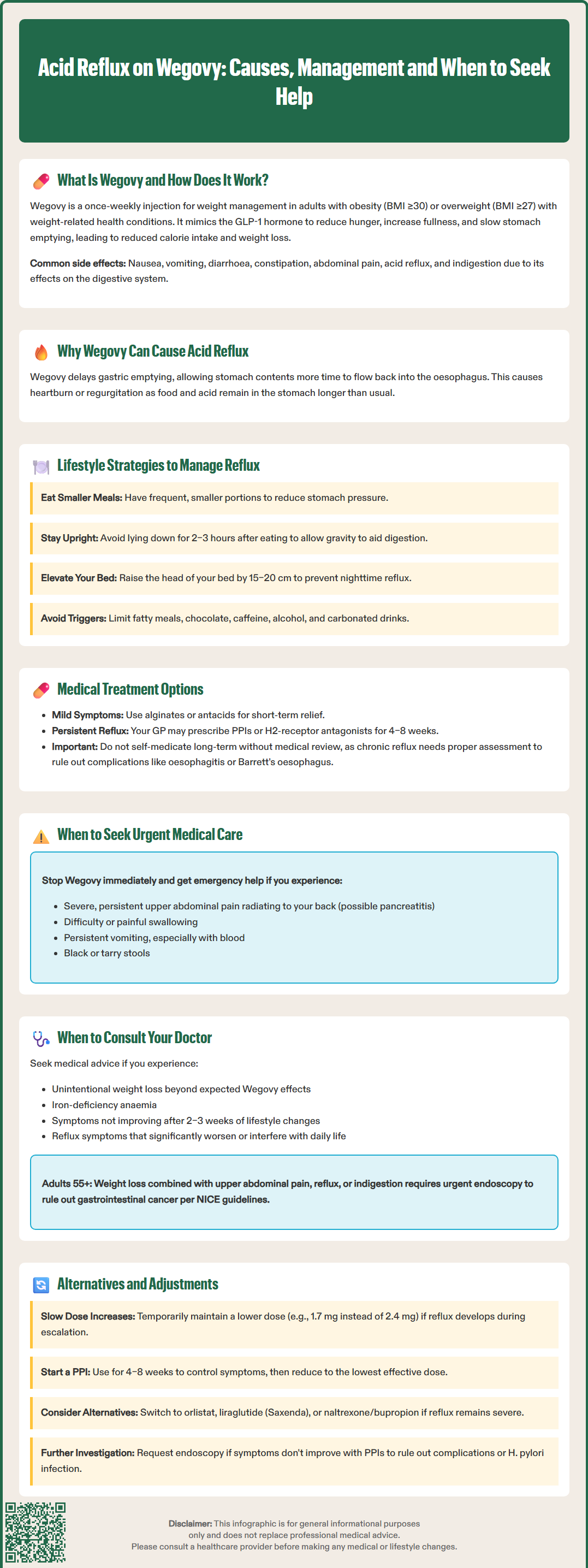
Acid reflux is a recognised adverse reaction in people taking Wegovy (semaglutide 2.4 mg), a GLP-1 receptor agonist licensed in the UK for weight management. Wegovy works by reducing appetite and slowing gastric emptying, which can contribute to reflux symptoms in some individuals. Whilst many people tolerate the medication well, understanding how to manage reflux—through lifestyle modifications, appropriate pharmacotherapy, and knowing when to seek medical advice—is essential for optimising treatment outcomes. This article provides practical guidance on managing acid reflux whilst taking Wegovy, when to consult a healthcare professional, and what alternatives may be considered if symptoms persist.
Quick Answer: Acid reflux is a recognised adverse reaction to Wegovy (semaglutide), caused primarily by delayed gastric emptying, and can be managed with lifestyle modifications, alginates, or proton pump inhibitors.

Mounjaro® is the most innovative GLP-1 medication proven to dramatically curb appetite, hunger, and cravings to help professional men achieve substantial weight loss.
Start Here
Wegovy® is a weekly injectable GLP-1 medication with proven effectiveness in reducing appetite, hunger, and cravings to help busy professionals lose significant weight.
Start HereWegovy (semaglutide 2.4 mg) is a prescription medicine licensed in the UK for weight management in adults with obesity (BMI ≥30 kg/m²) or overweight (BMI ≥27 kg/m²) with at least one weight-related comorbidity, such as type 2 diabetes or hypertension. It is administered as a once-weekly subcutaneous injection and is intended to be used alongside a reduced-calorie diet and increased physical activity.
Wegovy belongs to a class of medications called glucagon-like peptide-1 (GLP-1) receptor agonists. Semaglutide mimics the action of the naturally occurring hormone GLP-1, which is released by the intestine in response to food intake. By activating GLP-1 receptors in the brain, particularly in areas that regulate appetite, Wegovy reduces hunger and increases feelings of fullness (satiety). This leads to a reduction in calorie intake and, consequently, weight loss.
The mechanism of action also involves slowing gastric emptying—the rate at which food leaves the stomach and enters the small intestine. While this contributes to prolonged satiety and improved glycaemic control, it can also affect the gastrointestinal tract in ways that may lead to side effects. Common gastrointestinal adverse effects reported with Wegovy include nausea, vomiting, diarrhoea, constipation, and abdominal pain. Gastro-oesophageal reflux disease and dyspepsia are also listed adverse reactions in the Wegovy Summary of Product Characteristics (SmPC), with delayed gastric emptying potentially contributing to these symptoms in some people.
It's important to note that acute pancreatitis has been reported with GLP-1 receptor agonists including semaglutide. If acute pancreatitis is suspected (severe, persistent upper abdominal pain, sometimes radiating to the back), Wegovy should be discontinued immediately and urgent medical attention sought.

Acid reflux occurs when stomach acid flows back into the oesophagus, causing symptoms such as heartburn, regurgitation, and an unpleasant sour taste in the mouth. Gastro-oesophageal reflux disease and dyspepsia are listed adverse reactions in the Wegovy SmPC. The medication's effect on delaying gastric emptying may contribute to reflux symptoms in susceptible individuals. When food remains in the stomach for longer periods, there is an increased opportunity for stomach contents to reflux into the oesophagus, particularly if the lower oesophageal sphincter is weakened.
Practical lifestyle modifications can significantly reduce reflux symptoms:
Eat smaller, more frequent meals rather than large portions, which can increase gastric pressure.
Avoid lying down within 2–3 hours after eating to allow gravity to assist digestion.
Elevate the head of the bed by 15–20 cm to reduce nocturnal reflux.
Identify and avoid trigger foods, such as fatty or spicy meals, chocolate, caffeine, alcohol, and carbonated drinks.
Maintain a healthy weight, as excess abdominal fat can increase pressure on the stomach.
Quit smoking, as tobacco weakens the lower oesophageal sphincter.
Pharmacological management may be appropriate for persistent symptoms. For first-line symptomatic relief, particularly for post-prandial reflux or nocturnal symptoms, alginates (such as sodium alginate/antacid combinations) are recommended. Over-the-counter antacids (e.g., magnesium or aluminium hydroxide) can provide short-term relief. For more frequent or troublesome reflux, proton pump inhibitors (PPIs) such as omeprazole or lansoprazole, or H2-receptor antagonists like famotidine may be recommended by a GP. PPIs are typically tried for 4–8 weeks with review and step-down to the lowest effective dose or on-demand therapy. Patients should not self-medicate long-term without medical review, as chronic reflux requires proper assessment to exclude complications such as oesophagitis or Barrett's oesophagus.
While mild, occasional acid reflux can often be managed with lifestyle changes and over-the-counter remedies, certain symptoms warrant prompt medical evaluation. Patients taking Wegovy should be aware of red flag symptoms that may indicate more serious underlying conditions or complications.
Seek urgent medical advice if you experience:
Dysphagia (difficulty swallowing) or odynophagia (painful swallowing), which may suggest oesophageal stricture, inflammation, or other pathology. Dysphagia at any age warrants urgent endoscopy referral.
Persistent vomiting, particularly if it contains blood (haematemesis) or resembles coffee grounds, indicating possible gastrointestinal bleeding.
Unintentional weight loss beyond that expected from Wegovy treatment, which could signal malignancy or other serious disease.
Melaena (black, tarry stools) or visible blood in stools, suggesting gastrointestinal bleeding.
Iron-deficiency anaemia, which may indicate chronic gastrointestinal blood loss.
Severe or persistent abdominal pain, especially if localised to the upper abdomen, which may indicate peptic ulcer disease or pancreatitis.
Symptoms that do not improve with lifestyle modifications and over-the-counter treatments after 2–3 weeks.
If severe, persistent upper abdominal pain (especially radiating to the back) occurs, stop Wegovy immediately and seek urgent medical attention due to the risk of acute pancreatitis.
According to NICE guidance (NG12), adults aged 55 and over with weight loss and upper abdominal pain, reflux, or dyspepsia should be considered for urgent endoscopy to exclude upper gastrointestinal malignancy. Additionally, if reflux symptoms significantly worsen after starting Wegovy, or if they interfere with daily activities and quality of life, a review with the prescribing clinician is advisable. The GP may consider dose adjustment, additional investigations such as endoscopy, or referral to a gastroenterologist for specialist assessment. It is important not to discontinue Wegovy without medical guidance, except in cases of suspected acute pancreatitis, as abrupt cessation may affect weight management goals.
For patients experiencing persistent or troublesome acid reflux while taking Wegovy, several strategies can be considered in consultation with a healthcare professional. The approach should be individualised, balancing the benefits of continued weight management therapy against the impact of gastrointestinal side effects on quality of life.
Dose titration and adjustment may help. Wegovy is initiated at a low dose (0.25 mg weekly) and gradually increased over 16–20 weeks to the maintenance dose of 2.4 mg weekly. If reflux symptoms emerge or worsen during dose escalation, the prescriber may consider slowing the titration schedule or maintaining a lower dose temporarily to allow the gastrointestinal system to adapt. According to the SmPC, dose escalation can be delayed by 4 weeks if needed, and some patients may achieve satisfactory weight loss at a sub-maximal dose (e.g., 1.7 mg) if the 2.4 mg dose is not tolerated.
Optimising reflux management with appropriate pharmacotherapy is essential. A trial of a proton pump inhibitor (PPI) for 4–8 weeks is often effective in controlling acid-related symptoms, with review and step-down to the lowest effective dose afterwards. If dyspepsia predominates, testing for and treating Helicobacter pylori infection may be appropriate per NICE guidance. If symptoms persist despite PPI therapy, further investigation (e.g., oesophagogastroduodenoscopy or oesophageal pH monitoring) may be warranted to assess for complications or alternative diagnoses such as functional dyspepsia.
Alternative weight management medications may be considered if reflux symptoms remain intolerable despite optimal management. Other options licensed in the UK include:
Orlistat, a lipase inhibitor that reduces fat absorption (though it has its own gastrointestinal side effects, primarily steatorrhoea).
Liraglutide 3.0 mg (Saxenda), another GLP-1 receptor agonist with a similar mechanism but different dosing. Individual response varies, and both GLP-1 receptor agonists can cause gastrointestinal adverse effects.
Naltrexone/bupropion (Mysimba), which may be suitable for some patients, subject to clinical assessment and local commissioning arrangements.
In selected cases, bariatric surgery may be appropriate for patients with severe obesity who meet NICE criteria and have not achieved adequate weight loss with pharmacotherapy. Surgical options such as sleeve gastrectomy or gastric bypass can be highly effective but carry their own risks and require careful consideration.
Ultimately, the decision to continue, adjust, or switch therapy should be made collaboratively between the patient and their healthcare team, taking into account individual circumstances, treatment goals, and the overall risk-benefit profile. Patients should report any suspected side effects via the MHRA Yellow Card scheme.
Yes, gastro-oesophageal reflux disease and dyspepsia are listed adverse reactions in the Wegovy Summary of Product Characteristics. Wegovy slows gastric emptying, which can increase the opportunity for stomach contents to reflux into the oesophagus in susceptible individuals.
Lifestyle modifications such as eating smaller meals, avoiding lying down within 2–3 hours after eating, elevating the head of the bed, and avoiding trigger foods can help. Alginates or over-the-counter antacids provide symptomatic relief, and your GP may recommend a proton pump inhibitor for persistent symptoms.
Seek urgent medical advice if you experience difficulty swallowing, persistent vomiting (especially with blood), unintentional weight loss, black tarry stools, severe upper abdominal pain, or if symptoms do not improve with lifestyle changes and over-the-counter treatments after 2–3 weeks.
All medical content on this blog is created based on reputable, evidence-based sources and reviewed regularly for accuracy and relevance. While we strive to keep content up to date with the latest research and clinical guidelines, it is intended for general informational purposes only.
DisclaimerThis content is not a substitute for professional medical advice, diagnosis, or treatment. Always consult a qualified healthcare professional with any medical questions or concerns. Use of the information is at your own risk, and we are not responsible for any consequences resulting from its use.